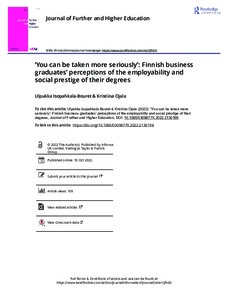'You can be taken more seriously': Finnish business graduates' perceptions of the employability and social prestige of their degrees
Ojala Kristiina; Isopahkala-Bouret Ulpukka
https://urn.fi/URN:NBN:fi-fe2022112968056
Tiivistelmä
This article focuses on the university graduates' perceptions of their employability, and particularly how the social prestige of degrees relates to such perceptions. It defines employability in terms of positional conflict and makes an argument that perceptions of the employability and prestige are socially mediated and require social recognition; therefore, this study is drawing on current theories on social valuing and the social construction of prestige, which is a novel approach in the field of employability research. Based on 48 graduate interviews, this study aims to investigate how recent graduates themselves interpret rank differences and the social standing of their own degrees. The focus is on business degrees from Finnish universities and universities of applied sciences. Our findings demonstrate how graduates mobilise various valuation criteria, such as (1) the formal level of a degree (bachelor's or master's level), (2) selectivity of degree programmes, (3) orientation of studies, and (4) work-readiness. Moreover, graduates assign commonly shared values and beliefs within these criteria. The results contribute to a growing scholarly interest not only in studying established rank orders but also in focussing on the social aspects of valuation which create stratification. Overall, the theory and findings of this study suggest a need to focus on the meaning patterns and social valuation in the future research on employability. It is important for universities, employers and policymakers to understand how the processes of prestige accumulation enhance graduate employability and (re)produce societal and occupational inequalities.
Kokoelmat
- Rinnakkaistallenteet [19218]
